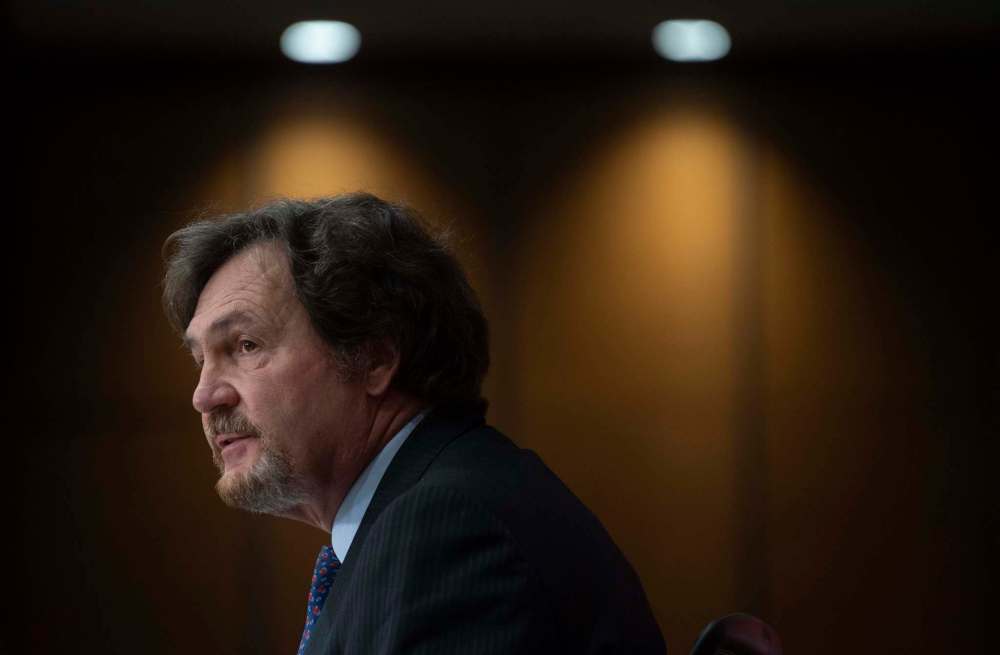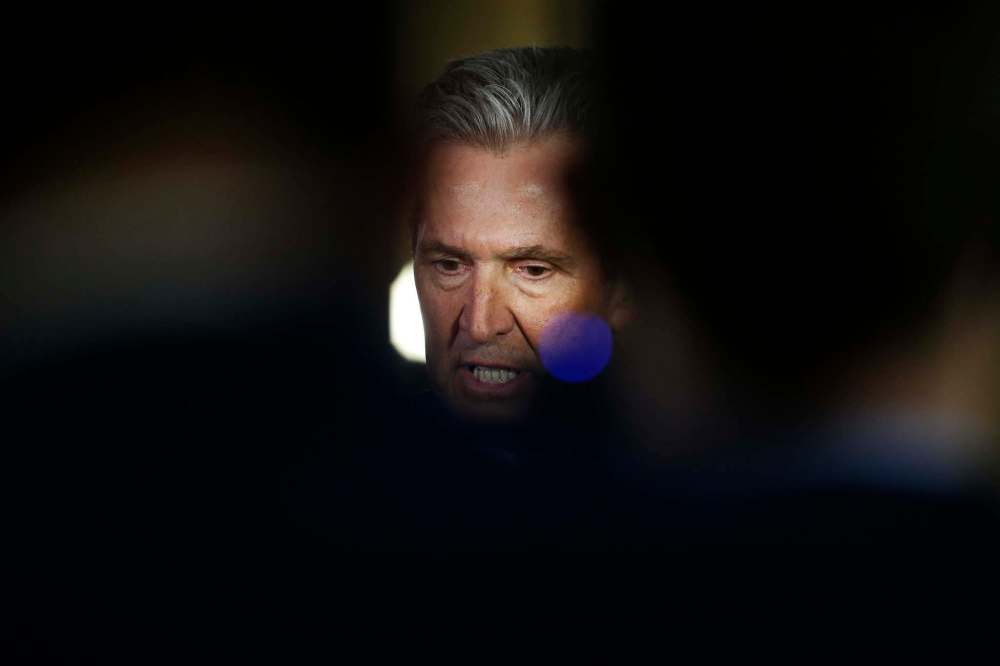Pallister’s optimism over climate ruling out of sync with reality
Read this article for free:
or
Already have an account? Log in here »
To continue reading, please subscribe:
Monthly Digital Subscription
$0 for the first 4 weeks*
- Enjoy unlimited reading on winnipegfreepress.com
- Read the E-Edition, our digital replica newspaper
- Access News Break, our award-winning app
- Play interactive puzzles
*No charge for 4 weeks then price increases to the regular rate of $19.00 plus GST every four weeks. Offer available to new and qualified returning subscribers only. Cancel any time.
Monthly Digital Subscription
$4.75/week*
- Enjoy unlimited reading on winnipegfreepress.com
- Read the E-Edition, our digital replica newspaper
- Access News Break, our award-winning app
- Play interactive puzzles
*Billed as $19 plus GST every four weeks. Cancel any time.
To continue reading, please subscribe:
Add Free Press access to your Brandon Sun subscription for only an additional
$1 for the first 4 weeks*
*Your next subscription payment will increase by $1.00 and you will be charged $16.99 plus GST for four weeks. After four weeks, your payment will increase to $23.99 plus GST every four weeks.
Read unlimited articles for free today:
or
Already have an account? Log in here »
Hey there, time traveller!
This article was published 25/03/2021 (1721 days ago), so information in it may no longer be current.
If anyone establishes a unit price for optimism in the face of a futile struggle, Premier Brian Pallister would be a very rich man indeed.
Pallister’s unbridled optimism was on full display Thursday, as the Supreme Court of Canada upheld the federal government’s constitutional right to impose carbon pricing in provinces that have no comparable plan.
There was no joy in Alberta, Saskatchewan and Ontario, the provinces that tried to strike down Ottawa’s carbon tax plan. However, in Manitoba, which has launched a parallel legal action in Federal Court, the Supreme Court defeat was actually good news.
Yes, good news.

“We’re optimistic with the decision and the wording in it, that we have a case to make and we’re looking forward to hearing the court rule on our own,” Pallister told reporters.
Pallister said that while the Supreme Court decision upheld the federal government’s right to make laws to address issues of national importance, even if they infringe on areas of provincial jurisdiction, it also affirmed that Ottawa’s authority is not “unfettered.”
In Pallister’s world, this is an important limitation on federal power. In just about everyone else’s world, that is an extremely narrow view of the decision.
The mere fact that the high court elected to hear this case is proof the federal government has no “unfettered” power to intercede in areas of provincial jurisdiction. In this case, unfettered means that the provinces have the full right to challenge, and Ottawa must be willing to defend its actions in court.
And that is what happened. Ontario, Alberta and Saskatchewan did not want carbon pricing of any kind and were hoping against hope in their own way that the high court would reject Ottawa’s policy. When it was over, the Supreme Court was pretty confident (albeit, in a 6-3 split decision) that climate change is “a threat of the highest order to the country, and indeed the world,” Chief Justice Wagner wrote on behalf of the majority. 
“This context, on its own, provides some assurance that… Canada is not seeking to invoke the national concern doctrine too lightly. The undisputed existence of a threat to the future of humanity cannot be ignored.”
Pallister’s only legal foothold now is to argue that Manitoba’s homegrown climate change policy can meet or exceed the federal government’s “outcome-based targets,” as the court put it. Even though the premier is buoyant to the point of giddiness that he can do that, there are not many who share his optimism.

The first problem is that Manitoba doesn’t have much of a plan. In the fall of 2017, Pallister unveiled his climate plan, which included a $25-per tonne carbon tax and a long list of vague promises about what it would do with the money it collected.
Pallister’s strategy was to implement a carbon tax in Manitoba that was slightly higher than the floor price ($20 per tonne) set by Ottawa. But, he wanted an agreement Manitoba could keep carbon taxes here at $25 while they rose in the rest of the country to at least $50 per tonne. Ottawa gave Manitoba the big thumbs-down.
Pallister’s reaction was bizarre, to say the least. He pulled the Manitoba plan off the table for reasons that have never been fully explained. Ottawa shrugged, and began charging and collecting tax on Manitoba’s behalf and, in the first full year, remitted about $175 million in carbon tax rebates directly to individuals.

Little has happened since then other than Pallister’s decision to take his tenuous case to Federal Court.
All of which brings us to today, and Pallister’s insistence that a legal setback suffered by three other provinces helps Manitoba in its court challenge.
Manitoba could, in theory, win that challenge, or even get the feds to back down during negotiations, if Pallister could prove that what he wants to do is as good or better than Ottawa’s plan. But he can’t, because it isn’t.
From the start, Pallister’s goal has been to find a way for Manitobans to pay less carbon tax than residents of other provinces. Although that’s an impressive demonstration of Pallister’s capacity to put self-interest ahead of national interests, it’s unlikely to be persuasive in Federal Court.
Even this week, when asked what his new counter-proposal would be to get Ottawa to approve a made-in-Manitoba solution, Pallister stuttered and equivocated.
Pallister’s green plan, as unveiled, had some good elements, but the premier’s failure to make meaningful progress on climate change, and his petulant tantrums over Ottawa’s decision to impose a federal tax, leave us without much of a climate change policy at all.
Even this week, when asked what his new counter-proposal would be to get Ottawa to approve a made-in-Manitoba solution, Pallister stuttered and equivocated. If he still has a plan, he can’t seem to enunciate it in any detail.
Pallister, no doubt, thinks that continuing to fight Ottawa in court makes him look good. He forgets that the gross majority of Manitobans want less legal wrangling and more action to curb climate change.
dan.lett@freepress.mb.ca

Born and raised in and around Toronto, Dan Lett came to Winnipeg in 1986, less than a year out of journalism school with a lifelong dream to be a newspaper reporter.
Our newsroom depends on a growing audience of readers to power our journalism. If you are not a paid reader, please consider becoming a subscriber.
Our newsroom depends on its audience of readers to power our journalism. Thank you for your support.








